Youtube Link: https://youtu.be/Dolwu8mIiQY
Transcript:
Z: Hello, I’m Dorothy, and today we’re delving into a unique intersection between film and architecture.
W: And I’m Makayla. We’ll be exploring the theme of vanishing spaces through two lenses: the natural world in film and urban development in reality.
Z: The cinema, much like architecture, is a vessel for our collective dreams and fears. In ‘The Mighty Peking Man,’ the dense foliage of the primeval forest is not simply a backdrop but a character in its own right—an embodiment of a world that once was. Here, the forest breathes, fights, and succumbs, much like our urban landscapes do.
W: Through Chen Zhengfeng’s journey in the Indian forests hunting the mighty peking man, the film highlights the collision of human greed against nature’s grandeur.
Z: ‘The Mighty Peking Man’ isn’t just a science fiction spectacle. It’s a narrative ripe with Hong Kong cinema’s quintessential elements – star power, exotic locales, and a critique of exploitative practices.
W: This pure land is vanishing under the pressure of profit-driven motives, a powerful metaphor for real-world environmental concerns.
Z: As depicted in the film, the primeval forest stands as humanity’s last sanctuary, untouched and beautiful. But it’s also in peril, threatened by the very hands it could save.
W: Also, the film was shot in Central, where we had a field trip.
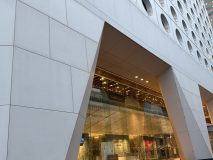
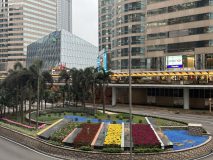
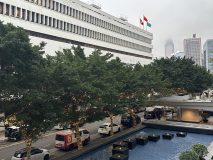
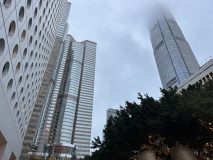
Z: Shifting our view to Hong Kong, our videos capture the city’s architecture in flux. Iconic structures and spaces are giving way to modern development. As shown in the videos, we visited Jardine House and observed its surroundings. Central is indeed a very busy place. So, what’s disappearing?
W: On the day of the field trip, we noticed that some buildings were under construction or planned to be demolished around the observation wheel. So I think the observation wheel may disappear.
Z: Yes, I think so. The observation wheel in Central looks out of place in a pile of construction sites and is no longer that popular. However, it would be the tangible heritage, the spaces that once defined Hong Kong’s cultural and architectural identity. We see this in buildings earmarked for demolition or redevelopment. Their history and memories are fading, much like the forests in our featured film.
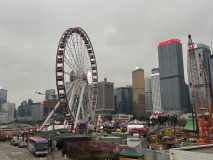
W: So, who’s affected?
Z: Everyone. From local shop owners to residents who’ve called these neighborhoods home for generations.
W: Feelings range from nostalgia to protest. The fabric of the community is being altered, and not everyone is ready to say goodbye.
Z: In response to this vanishing, some advocate for preservation, others for thoughtful redevelopment. It’s a complex dialogue between progress and memory.
W: So the questions arise: What inherent values are we losing with these spaces? And what are the implications for the community’s soul?
Z: Much like ‘The Mighty Peking Man’s’ conservation message, there’s a call to protect the soul of our city. To remember that once gone, these spaces are lost forever.
W: We must ask ourselves what legacies we choose to leave behind and at what cost. The films we watch and the cities we live in are not just entertainment or habitats; they are mirrors reflecting our values and choices.
Z: In closing, whether it’s the fictional forests of ‘The Mighty Peking Man’ or the very real streets of Hong Kong, the conversation on vanishing spaces is critical.
W: The very architecture of Hong Kong tells a story—a narrative constructed over centuries. It speaks of colonial pasts, of East meets West, of traditions held in the tight grip of progress. These structures are repositories of a collective memory, each brick and beam a sentence in our city’s ongoing story.
Z: We must pause and ponder the cost of our relentless pursuit of the new, the price of progress. What wisdom do we forsake when the old is swept away? Do we not, in the act of demolition, also tear down the intangible edifices of our identity and heritage?
W: With this, we conclude our dialogue today, but the conversation is far from over. The tapestry of our city’s heritage, much like the cinematic tales we cherish, deserves more than a passing glance; it warrants our full attention, our action, our care.
Z: Let us carry forward this discourse, beyond the confines of this room, into the very spaces we inhabit. Together, we can script a future that honors our past, cherishes our present, and safeguards the sanctuary of our shared humanity.
[Ending]
Zhou Manze 3036265515
Wang Junqi 3036265369